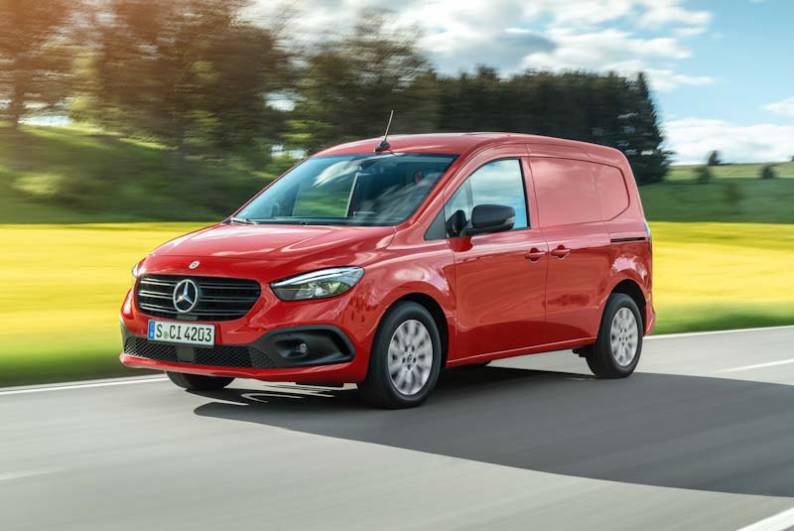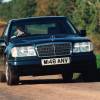
RAC sale – up to 33% off*
• Roadside cover from £5.29 a month†
• We get to most breakdowns in 60 mins or less
• Our patrols fix 4/5 breakdowns on the spot

Mercedes campaigns in the compact part of the EV van market with this eCitan. Jonathan Crouch takes a look.
Ten Second Review
The eCitan is the most class-competitive Mercedes EV van yet, thanks to borrowed Renault mechanicals, which it clothes with slightly smarter packaging. We've waited a long time for a small battery-powered Mercedes LCV. Can this one live up to expectations?
Background
One of the unexplained mysteries in the van industry is why Mercedes never offered a full-electric version of its first generation small LCV, the Citan, sold between 2013 and 2022. That Citan was, after all, based almost entirely on the Renault Kangoo, the first small van in the industry to adapt adopt full-electric power back in 2011. Fast forward to 2023 and the very different market landscape means that there is absolutely no chance of Mercedes ignoring full-battery tech for its second generation Citan. Indeed, this MK2 model, which still sells mainly as a diesel, will be the last new Mercedes van to offer a combustion engine.
This second generation design also shares Kangoo mechanicals in both its forms, making it also basically the same proposition as a Nissan Townstar. Which means in the case of the eCitan EV model we look at here a 44kWh battery with very competitive range and charging stats. Let's take a closer look.
Driving Experience
In some ways, Mercedes' reticence to fit a full-electric drivetrain to the previous generation Citan is easy to understand. Even the final versions of the first generation Kangoo Z.E. were slow to charge and could go just 143 miles between spells of replenishment for the relatively small 33kWh battery. The second generation Kangoo E-Tech powertrain that Mercedes has borrowed for this eCitan is a much stronger proposition. There's a much bigger, more easily chargeable 44kWh battery which can take this LCV 176 miles between charges (for some reason 10 miles less than an equivalent Kangoo E-Tech).
It's an eager unit with 90kW (122hp) of power and 245Nm of torque. There are two drive programmes - 'Comfort' and 'Eco' - the latter optimising range but restricting engine output. There are also three selectable brake recuperation levels - 'D-', 'D' and 'D+'. Mercedes says that it's worked hard to give this Citan 'Mercedes DNA' in the way that it rides and handles, re-tuning damping and driving dynamics to better suit brand values. With some other EV vans, all the deletion of a combustion engine does is to emphasise wind and tyre roar, but there's little of that here. And there's a whole range of advanced camera drive assist features available which could never have been fitted to the previous model.
Design and Build
There's very little to visually distinguish the eCitan from its diesel-engined showroom stablemates. If you're sold on the idea of one, you'll be pleased to note that, like the black pump-fuelled version, it doesn't look anything like its Renault Kangoo close cousin - or the equally closely-related Nissan Townstar either. Instead, if Mercedes was going to make a compact van, this is pretty much how you'd expect it to look, with hints of B-Class and Sprinter and a large grille with the usual big Three Pointed Star in the centre. As you'd expect in this class, there's a choice of short or long wheelbase body styles and a single roof height.
Inside, somewhat predictably, it's all a lot nicer than you might ever expect a van to be. The round air vents from the brand's passenger cars feature, though here they usually have a gloss black finish. And there's a 5.5-inch central MBUX infotainment screen with clear graphics and loads of media connectivity, plus 'Hey Mercedes' voice functionality. Because the display is quite small, the ventilation controls remain separated out beneath it.
Market and Model
Think in terms of an asking price span of around £34,000 to £36,000 (ex VAT) for an eCitan, but from that you can deduct the £2,500 government Plug-in Van Grant. That represents a premium of around £10,000 over the diesel version. As with the diesel, there's a choice of two body lengths, short wheelbase 'L1' and long wheelbase 'L2'. Either way, there are two trim levels, 'Progressive' and 'Premium'.
All Citan cab interiors boast heat-insulating glass all round and multi-function steering wheels that adjust for both rake and height. Exterior design touches include 16-inch wheels (design wheels on the 'Progressive' and alloys on the 'Premium') and heated, electrically adjustable side mirrors. 'Premium'-spec adds a range of cosmetic enhancements including body-coloured bumpers, chrome trim, gloss black dashboard finish, a Dynamic exterior package with metallic paint and unique alloy wheels and a Light package, which comprises LED high-performance headlights with High Beam Assist and front foglamps.
You don't have to pay extra for strong standards of basic safety. There's a robust body structure with energy-absorbing dissipation paths and driving assistance and parking systems that observe the traffic and surroundings and, if necessary, can issue warnings or assist the driver by intervening. As in the new generations of the Mercedes C-Class and S-Class, Active Lane Keeping Assist uses steering interventions as opposed to braking. In addition to the legally required ABS and ESP systems, Citan models are also equipped with Hill Start Assist, Crosswind Assist, the fatigue-warning system ATTENTION ASSIST and the Mercedes-Benz emergency call system as standard. Plus there are up to six airbags.
Practicalities and Costs
Carriage capacity is unaffected by the EV installation. The Citan combines compact exterior dimensions (L1 model length: 4498mm) with a generous amount of space. Even in that smaller L1 variant (with 2716mm of wheelbase length), the Citan offers much more space compared with the predecessor model. The short wheelbase panel van load compartment length, for example, is a useful 3.05 metres to the flexible partition wall.
As usual in this segment, one sliding door is standard and a second is optional. Each will offer a wide opening measuring 615mm. The height of the load compartment opening is 1059mm. The loading sill of the panel van sits at a height of 59cm. Meanwhile, the two sections of the rear doors can be blocked at an angle of 90 degrees and can even be moved through 180 degrees to the sides of the vehicle. The doors are asymmetrical, whereby the left-hand door is wider and has to be opened first.
As for total capacity, select either the 3.3m3 short wheelbase L1 model or the 4.2m3 long wheelbase L2 version. And the payload? Well that's not much different from the combustion models either. For the standard van, this is limited to around 600kgs, but the longer wheelbase versions can carry up to 800kg because of a higher plated gross vehicle weight. All models can squeeze in a standard Euro pallet thanks to the generous 1,248mm width between the wheel arches that all Citans share.
Costs are kept well in check thanks to the proven Renault engineering. We gave you the eCitan's 176 mile driving range figure earlier. It offers 22kW AC charging and at rapid charging DC stations, the battery is expected to take 38 minutes to charge from 10 to 80 percent with the installed 75kW DC charger.
Summary
The eCitan, we're told, has been "completely redeveloped by professionals for professionals" according to Mercedes. The use of the word 'redeveloped' is telling. The brand might claim that the Citan has "the DNA of Mercedes-Benz" but the truth is that it's a posher Renault Kangoo - or, as in this case, a posher Kangoo E-Tech Electric. Nothing wrong with that. Van buyers can sometimes be more badge-conscious than car folk - and for worthier reasons: the impression your company makes during its deliveries can say a lot about it. And if those deliveries are being conducted by an eCitan, there's the added bonus of an assumed eco-commercial remit.
Whether the price to pay for all of this can be justified will depend on the outlook of your business - and probably its size; we suspect that this Mercedes will be favoured by smaller companies rather than larger ones. These people will find this a very polished contender.







